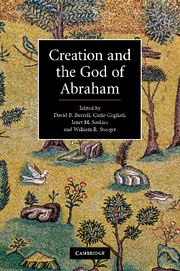Book contents
- Frontmatter
- Contents
- Contributors
- Preface
- Introduction
- 1 Creation ex nihilo: early history
- 2 Creatio ex nihilo: its Jewish and Christian foundations
- 3 The act of creation with its theological consequences
- 4 Scotistic metaphysics and creation ex nihilo
- 5 Creation and the context of theology and science in Maimonides and Crescas
- 6 Creation: Avicenna's metaphysical account
- 7 Four conceptions of creatio ex nihilo and the compatibility questions
- 8 Will, necessity and creation as monistic theophany in the Islamic philosophical tradition
- 9 Trinity, motion and creation ex nihilo
- 10 The Big Bang, quantum cosmology and creatio ex nihilo
- 11 What is written into creation?
- 12 Creatio ex nihilo and dual causality
- 13 God and creatures acting: the idea of double agency
- 14 Thomas Aquinas on knowing and coming to know: the beatific vision and learning from contingency
- Index
- References
9 - Trinity, motion and creation ex nihilo
Published online by Cambridge University Press: 07 September 2010
- Frontmatter
- Contents
- Contributors
- Preface
- Introduction
- 1 Creation ex nihilo: early history
- 2 Creatio ex nihilo: its Jewish and Christian foundations
- 3 The act of creation with its theological consequences
- 4 Scotistic metaphysics and creation ex nihilo
- 5 Creation and the context of theology and science in Maimonides and Crescas
- 6 Creation: Avicenna's metaphysical account
- 7 Four conceptions of creatio ex nihilo and the compatibility questions
- 8 Will, necessity and creation as monistic theophany in the Islamic philosophical tradition
- 9 Trinity, motion and creation ex nihilo
- 10 The Big Bang, quantum cosmology and creatio ex nihilo
- 11 What is written into creation?
- 12 Creatio ex nihilo and dual causality
- 13 God and creatures acting: the idea of double agency
- 14 Thomas Aquinas on knowing and coming to know: the beatific vision and learning from contingency
- Index
- References
Summary
INTRODUCTION
The doctrine of creation ex nihilo apparently distinguishes theological cosmology from ancient Greek conceptions of a universe which has no temporal beginning (as in Aristotle) or a cosmos which is formed from pre-existent chaos, the khora (as in Plato's mythic cosmology, Timaeus). While the theological doctrine of creation marks a significant break from ancient Greek cosmology, more recently some have argued for a congruence between creation ex nihilo and contemporary Big Bang theories and the notion that the universe had a temporal beginning in the form of a singularity.
Does Big Bang cosmology confirm the doctrine of creation ex nihilo and the teaching that ‘in the beginning, God created the heavens and the earth’? Numerous cosmologists seem to interpret Big Bang cosmology in a way which precludes the notion of creation and a creator. For example, some account for the Big Bang in terms of a fluctuation in a primal vacuum known as ‘quantum tunnelling’ from nothing, from which the universe expanded according to what is known as inflation theory. ‘Nothing’ is defined by the cosmologist Alexander Vilenkin as a state with no classical space-time in which the basic categories of physics – space, time, energy, entropy and so on – seem to lose their meaning. This utterly uncaused emergence of the universe from nothing apparently accounts for the universe's existence without reference to anything beyond the universe itself. The universe is simply a brute fact.
- Type
- Chapter
- Information
- Creation and the God of Abraham , pp. 133 - 151Publisher: Cambridge University PressPrint publication year: 2010

